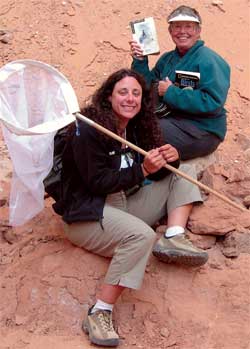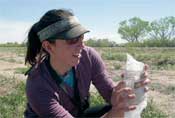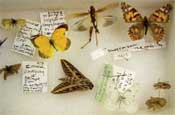
| INTERDISCIPLINARY TEAM-TEACHING: “Nabokov’s Butterflies” | |
| by Corinne Scheiner photos courtesy of Corinne Scheiner |
 |
| Corinne Scheiner with Alex Vargo |
The Block Plan allows faculty to work in an interdisciplinary manner, particularly via team-teaching, and thus to create a space in which to explore such commonalities. The course we teach centers on the intersections of Nabokov’s work as a novelist and his work as a lepidopterist. Our goal is to demonstrate, as Stephen Jay Gould suggests, that the “major linkage of science and literature lies in some distinctive, underlying approach that Nabokov applied equally to both domains — a procedure that conferred the same special features upon all his efforts.”
 It is this aesthetic — that is, Nabokov’s concern with detail in nature and literature, and his interest in observation and patterning — that informs our course. Bearing in mind Nabokov’s claim that “in a work of art there is a kind of merging between … the precision of poetry and the excitement of science,” we begin by reading from his autobiography, “Speak, Memory,” to discover how his interests in literature and butterflies merge in his life. We study the field of Lepidoptera, focusing on systematics, mimicry, and behavioral and ecological evolution. We read several of Nabokov’s literary works — novels, short stories, poems — in conjunction with his scientific writings and explore how Nabokov’s knowledge of these lepidopteral concepts play out in his work as a writer. Students continually experience “the precision of poetry” by closely reading Nabokov’s texts. As Allison Athens ’03 wrote in her journal, “Details, details, details. It’s all details.”
It is this aesthetic — that is, Nabokov’s concern with detail in nature and literature, and his interest in observation and patterning — that informs our course. Bearing in mind Nabokov’s claim that “in a work of art there is a kind of merging between … the precision of poetry and the excitement of science,” we begin by reading from his autobiography, “Speak, Memory,” to discover how his interests in literature and butterflies merge in his life. We study the field of Lepidoptera, focusing on systematics, mimicry, and behavioral and ecological evolution. We read several of Nabokov’s literary works — novels, short stories, poems — in conjunction with his scientific writings and explore how Nabokov’s knowledge of these lepidopteral concepts play out in his work as a writer. Students continually experience “the precision of poetry” by closely reading Nabokov’s texts. As Allison Athens ’03 wrote in her journal, “Details, details, details. It’s all details.”
| “ | Literature and butterflies are the two sweetest passions known to man.” |
| – Nabokov |
 Throughout the course, students also experience “the excitement of science” as they engage in hands-on lepidopterological activities: they learn to catch butterflies, moths, and other insects; they learn how to kill them; they learn how to spread the butterflies and moths they catch; and they learn how to identify their specimens. The Block Plan provides us with a unique opportunity: we take a weeklong field trip in which we re-enact one of Nabokov’s butterfly-hunting expeditions in the Southwest. Given that Nabokov wrote “Lolita” during such an expedition, we read “Lolita” as we do so.
Throughout the course, students also experience “the excitement of science” as they engage in hands-on lepidopterological activities: they learn to catch butterflies, moths, and other insects; they learn how to kill them; they learn how to spread the butterflies and moths they catch; and they learn how to identify their specimens. The Block Plan provides us with a unique opportunity: we take a weeklong field trip in which we re-enact one of Nabokov’s butterfly-hunting expeditions in the Southwest. Given that Nabokov wrote “Lolita” during such an expedition, we read “Lolita” as we do so.
To teach one’s passion is always a joy, and to teach with a colleague who is also passionate makes it even more so; however, the true pleasure of this course lies in instilling in others a passion not only for a particular subject, but also for interdisciplinary learning. In the words of another student: “This course affirms my belief in liberal arts.”
Corinne Scheiner is the Maytag Professor of Comparative Literature at CC.
Here's one of 35 facts about CC:
12
More than 93 percent of the faculty achieved the highest degrees in their fields.
The Colorado College | 14 East Cache La Poudre Street | Colo Sprgs, CO | 80903 | 719-389-6000